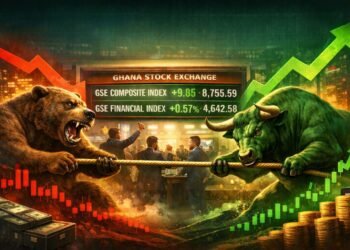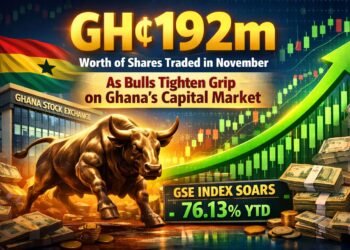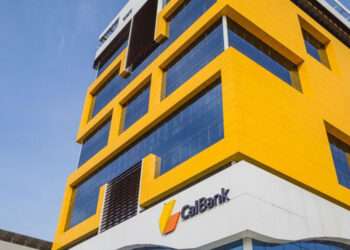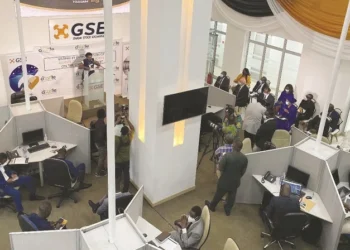The Ghana Stock Exchange (GSE) ended its final trading day of the week in a stalemate, with no gainers or losers across the five equities that participated.
While this flat performance may seem uneventful on the surface, a deeper dive into the data reveals mixed results in market trends over the past week, highlighting both opportunities and challenges for investors.
MTN Ghana, one of the largest and most actively traded companies on the GSE, led the day’s trading with a notable 1.4 million shares exchanged.
Despite this high volume, neither MTN Ghana nor the other stocks involved saw any price movement during the day. CalBank followed with 3,613 shares traded, Ecobank Transnational exchanged 2,980 shares, and Enterprise Group saw 953 shares traded.
Collectively, these companies formed the bulk of activity on the GSE for the day, but the lack of price changes underlined a market in equilibrium.
Performance of Market Indices
Regarding the performance of the GSE’s primary market indices, the benchmark GSE Composite Index (GSE-CI) saw no change on the final day of the week, holding steady at 4,364.83 points, the same level it opened at.
While this flat performance suggests stability in the short term, the GSE-CI did experience a 1-week loss of 0.35%. Despite this dip, the index reflects a 4-week gain of 0.39% and an impressive overall year-to-date gain of 39.44%.
This pattern highlights a market in flux— while weekly losses indicate some short-term volatility, the longer-term trajectory suggests the GSE has largely recovered from past dips and remains on a positive growth path for 2024.
Investors who maintain a longer outlook may find comfort in the year-to-date gain of over 39%, which signals strong overall market performance despite recent setbacks.
The GSE Financial Stocks Index (GSE-FSI), which tracks the performance of listed financial institutions, also held steady, maintaining its value at 2,198.88 points.
Similar to the GSE-CI, the GSE-FSI did not experience any movement during the final day of trading. However, it posted a 1-week gain of 0.39% and a more substantial 4-week gain of 3.79%, alongside a year-to-date gain of 15.63%.
This steady performance of the financial stocks index suggests that the sector remains resilient, even as other parts of the economy face headwinds. The financial sector has long been a cornerstone of the GSE, and its continued growth and stability offer reassurance to investors looking for reliable returns in an unpredictable market.
Decline in Trading Volume and Turnover
Despite the overall steadiness in market indices, the day’s trading activity saw a significant decline compared to the previous trading session. A total of 1,407,290 shares were traded, corresponding to a market value of GHS 3,040,887.07.
This represents a 47% drop in trading volume and a 50% decrease in turnover compared to the previous day’s activity on Thursday, October 4.
The sharp decline in trading volume and turnover suggests a pullback in investor participation, possibly due to market uncertainties or a “wait-and-see” approach ahead of potential developments in the coming week.
Such declines are not uncommon as the market adjusts to various economic factors, including investor sentiment, corporate earnings announcements, and macroeconomic policies that may influence trading behavior.
Long-Term Gains Amid Short-Term Stalemates
While the final day of trading ended in a stalemate, the broader picture of the GSE reveals a market that has performed robustly throughout 2024. The GSE Composite Index’s year-to-date gain of 39.44% indicates that investors with a longer-term perspective have seen their portfolios appreciate significantly over the course of the year.
In particular, the financial sector continues to be a strong performer, as evidenced by the GSE Financial Stocks Index’s year-to-date gain of 15.63%. The sector’s stability, reflected in the 4-week gain of 3.79%, showcases its ongoing importance to the GSE and the broader Ghanaian economy.
The total market capitalization of the Ghana Stock Exchange currently stands at GHS 99.2 billion, highlighting the significant size and impact of the market within the West African region.
Despite the final trading day’s lower activity levels, the GSE remains a critical platform for raising capital and generating wealth for companies and investors alike.
Meanwhile, the performance of the GSE in the coming weeks will depend on several factors, including corporate earnings reports, macroeconomic trends, and shifts in investor sentiment.
While the weekly loss of 0.35% may give some investors pause, the overall upward trajectory of the GSE Composite Index and the financial sector’s gains indicate that the market remains fundamentally sound.























